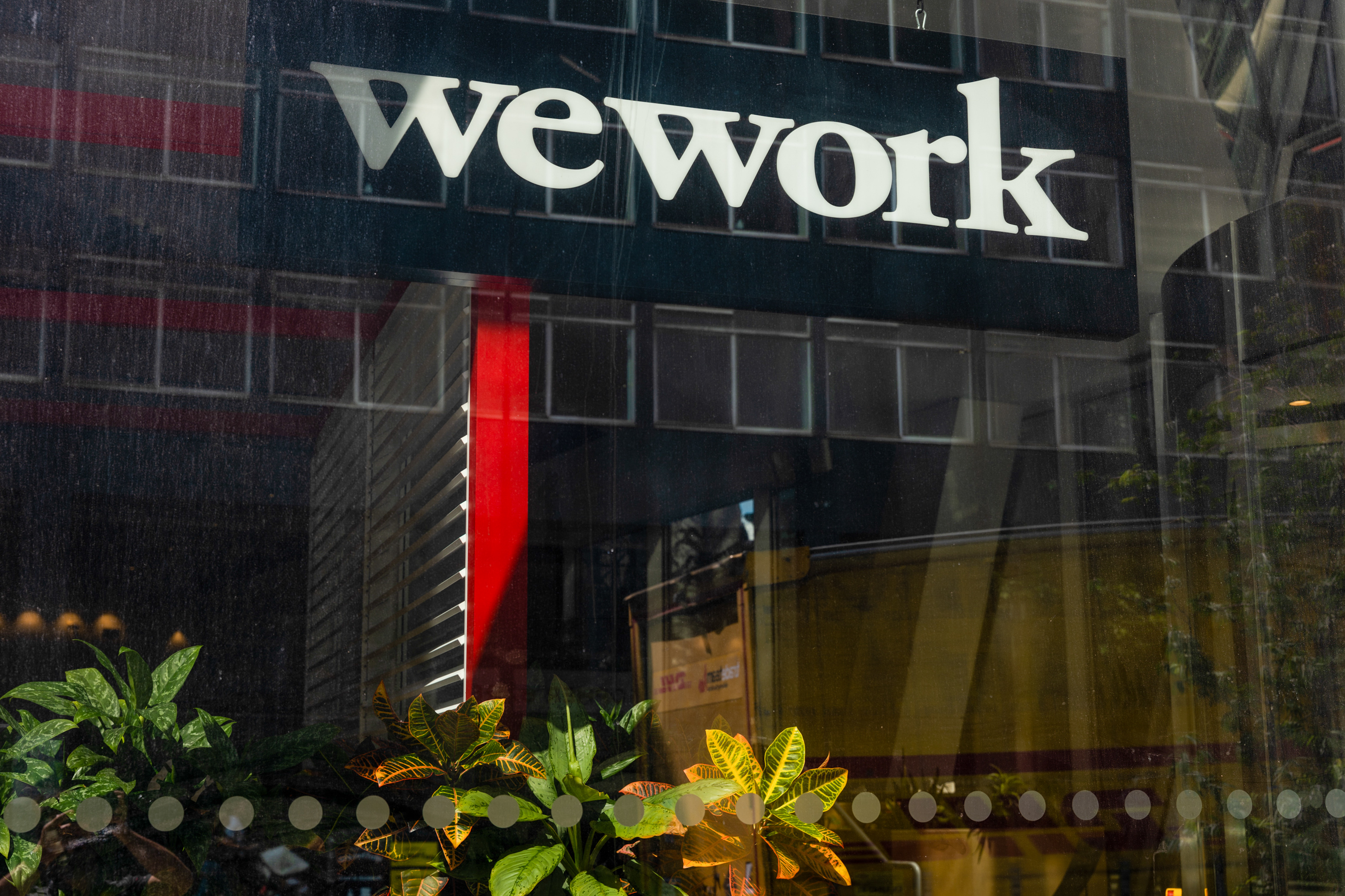WeWork warns of bankruptcy risk: How the workspace firm's finances became so fraught
WeWork’s protracted fall from grace could be nearing a definitive conclusion


WeWork’s latest financial difficulties suggest that the company is not only on a downward spiral, but fast becoming a relic of a bygone era in the world of work.
SEC filings this week painted a grim picture for the co-working space firm, with the company warning that its current “losses and negative cash flows” raise “substantial doubt” over its ability to continue operating.
“If we are not successful in improving our liquidity position and the profitability of our operations, we may need to consider all strategic alternatives,” the company said.
These ‘strategic alternatives’ could come in the form of debt refinancing, a reduction in business activities, the sale of assets, or even “obtaining relief under the US bankruptcy code”, WeWork added.
WeWork’s current financial standing certainly appears to have a dire outlook and follows several years of turbulence and losses.
In the first half of this year, the firm recorded a net loss of $700 million - grim figures that came after staggering losses of $2.3 billion in 2022 due to deteriorating economic conditions.
So what has gone wrong for WeWork?
Get the ITPro daily newsletter
Sign up today and you will receive a free copy of our Future Focus 2025 report - the leading guidance on AI, cybersecurity and other IT challenges as per 700+ senior executives
WeWork differently now
The current situation appears to be a confluence of issues that have placed the firm in a difficult position. The COVID-19 pandemic and shift to remote work did no favors for an organization whose entire proposition centers around office work.
This widespread shift to remote operations prompted a slew of firms globally to exit their leases once it became apparent that remote was there to stay.
RELATED RESOURCE

Accelerating FinOps & sustainable IT
Discover an application resource management tool that optimises costs and automates resourcing actions.
More recently, David Tolley, interim CEO at the firm specifically cited “higher member churn and softer demand” as key reasons for the current slump, along with an “excess supply in commercial real estate”.
Deteriorating economic conditions have also contributed to this downward spiral the company is on, with companies re-evaluating their in-office activities for myriad financial reasons. Rising energy costs also appear to have played a role in this decline.
Rick Smith, managing director at insolvency service Forbes Burton, told ITPro that the shift to remote and hybrid work has “undeniably” played a role in the current hardships experienced by the Softbank-backed firm.
"The contributing factors to this have included the fact that costs have gone up but there are also factors like energy and rents, which will be affecting the cost to run the workspaces,” he said.
“This, combined with changing attitudes to where and how people work with hybrid models of working becoming normal practice has a direct effect on WeWork’s bottom line. If they cannot keep up with this trend, it could spell further trouble.
"The shift to remote working has undeniably affected WeWork and their very business model seems to be under threat. The way people will work from now on will no doubt change again so unless there is something fundamental the company can pivot to cater for, it may be hard for them to take control of the current situation."
A protracted fall from grace
WeWork’s bleak outlook comes in stark contrast to pre-pandemic times in which the company’s offering was hailed as the “future of work”.
The company rapidly cozied up to the burgeoning global tech industry, offering startups and companies of all sizes the chance to embed themselves in its spaces that were marketed more as a self-sustaining ecosystem than a simple office space.
WeWork expanded rapidly over the course of several years, opening locations in more than 30 countries globally and expanding its member count to more than half a million.
At its zenith, WeWork was preparing to go public at a valuation of $47 billion, but that all came crashing down in 2019 with a botched IPO due to concerns over the longevity of the business model and the company leadership - namely Adam Neumann’s perceived erratic leadership style.
When it eventually went public in 2021, it did so at $9 billion, a fraction of what it was once valued at.
Now, the broader global technology sector is facing its own challenges, spurred on by economic disruption, inflation, and a wave of layoffs at the beginning of this year.
This certainly appears to have had a knock-on effect on the co-working space, and could herald even tougher times if investors get spooked, Smith warned.
"Business continuation for WeWork looks bleak at best,” he said. “They can hope to carry on, but if losses like this continue then investors will keep pulling their money and support, which has so far been holding the company afloat.
“Shareholders will start showing their overall disdain by selling off shares before the value drops even further. Once this starts it can be a very slippery slope.”
For years, the company was hailed as the very future of work, but the reality is that the way we work has changed, and the company has been unable to adapt to changing conditions.

Ross Kelly is ITPro's News & Analysis Editor, responsible for leading the brand's news output and in-depth reporting on the latest stories from across the business technology landscape. Ross was previously a Staff Writer, during which time he developed a keen interest in cyber security, business leadership, and emerging technologies.
He graduated from Edinburgh Napier University in 2016 with a BA (Hons) in Journalism, and joined ITPro in 2022 after four years working in technology conference research.
For news pitches, you can contact Ross at ross.kelly@futurenet.com, or on Twitter and LinkedIn.
-
 Bigger salaries, more burnout: Is the CISO role in crisis?
Bigger salaries, more burnout: Is the CISO role in crisis?In-depth CISOs are more stressed than ever before – but why is this and what can be done?
By Kate O'Flaherty Published
-
 Cheap cyber crime kits can be bought on the dark web for less than $25
Cheap cyber crime kits can be bought on the dark web for less than $25News Research from NordVPN shows phishing kits are now widely available on the dark web and via messaging apps like Telegram, and are often selling for less than $25.
By Emma Woollacott Published
-
 Young tech professionals are shunning a full-time return to the office – unless it pays more
Young tech professionals are shunning a full-time return to the office – unless it pays moreNews Young tech professionals who entered the workforce post-pandemic expect on-site work to be paid more than remote options.
By Emma Woollacott Published
-
 ‘Employers must look at the bigger picture’: Brits aren’t keen on going back to the office, and enterprises pushing for it risk a talent exodus – 48% of UK professionals would quit if faced with a full RTO mandate as hybrid work remains popular
‘Employers must look at the bigger picture’: Brits aren’t keen on going back to the office, and enterprises pushing for it risk a talent exodus – 48% of UK professionals would quit if faced with a full RTO mandate as hybrid work remains popularNews Nearly half of professionals would consider quitting rather than returning to the office full time
By Nicole Kobie Published
-
 IT professionals aren’t budging on flexible work demands – and more than half say they’ll quit if employers don’t meet expectations
IT professionals aren’t budging on flexible work demands – and more than half say they’ll quit if employers don’t meet expectationsNews Analysis from Randstad shows 40% of UK-based IT pros have quit over a lack of flexible work options, while 31% of workers globally have done the same.
By Ross Kelly Published
-
 Employees are dead set on flexible working arrangements – three quarters would turn down a role that didn't offer hybrid options as work-life balance becomes more important than pay
Employees are dead set on flexible working arrangements – three quarters would turn down a role that didn't offer hybrid options as work-life balance becomes more important than payNews New research shows workers are increasingly demanding flexible working arrangements from employers.
By Emma Woollacott Published
-
 Rugged devices
Rugged devicesWhitepaper A closer look at the challenges and rewards of fully supporting a flexible workplace
By ITPro Published
-
 Secure, flexible remote working
Secure, flexible remote workingWhitepaper A closer look at the challenges and rewards of fully supporting a flexible workplace
By ITPro Published
-
 Work smarter, not harder
Work smarter, not harderWhitepaper A closer look at the challenges and rewards of fully supporting a flexible workplace
By ITPro Published
-
 Cracks begin to show in hybrid working as more staff report ‘video call fatigue’ – but nearly a third would still quit if faced with an RTO mandate
Cracks begin to show in hybrid working as more staff report ‘video call fatigue’ – but nearly a third would still quit if faced with an RTO mandateNews Younger workers would rather quit than go back to the office full-time
By Nicole Kobie Published